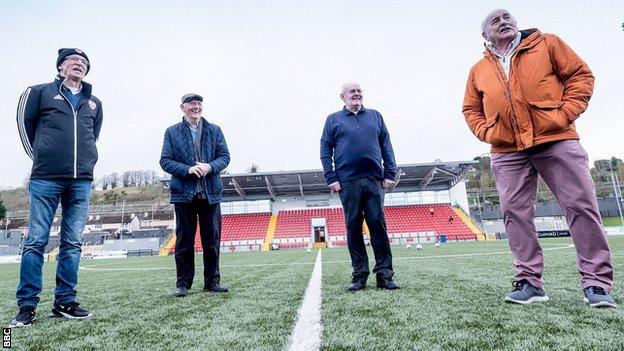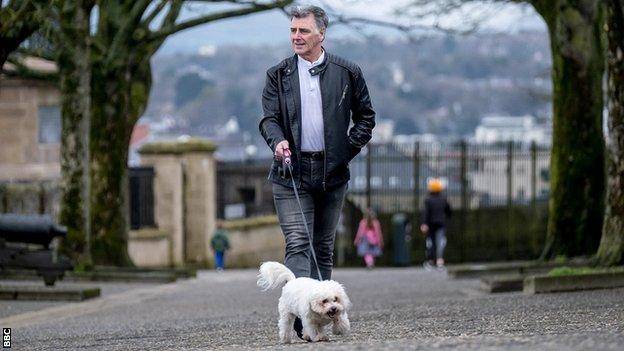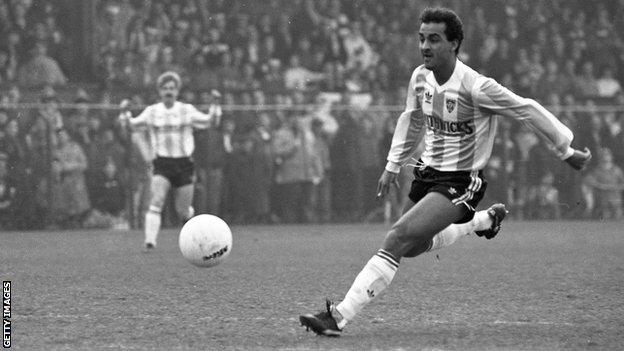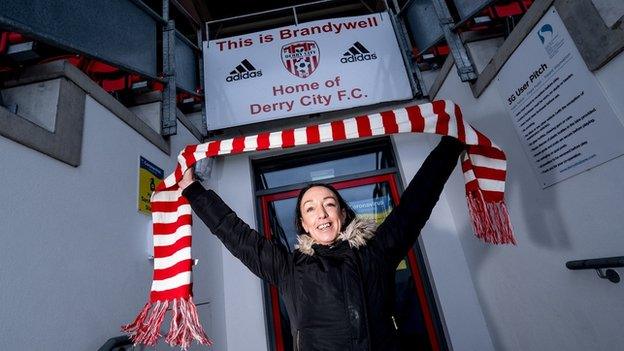Derry City's remarkable rebirth in League of Ireland recalled in BBC documentary
- Published

Tony O'Doherty, Terry Harkin, Eamonn McLaughlin and Eddie Mahon became known as the 'Gang of Four' who worked tirelessly to make Derry City's return to senior football a reality
"That particular day was more than about football. It was about a community. A community that had been wronged and forgotten about. It was this community saying 'look at us now'."
Felix Healy's Brandywell pride remains palpable all these years on as he recalls Derry City's 1989 FAI Cup final victory over Cork City when his winning goal sealed a historic League of Ireland treble less than four years after their admission to the Republic of Ireland's domestic league.
The remarkable tale of senior football's demise in the Maiden City during the early 1970s amid the mayhem brought by the Troubles before Derry City's glorious cross-border return is told in Different League: The Derry City Story which will be on BBC One Northern Ireland and BBC Two network at 21:00 BST on Monday 19 April.
Healy, who later managed the Candystripes to league and cup triumphs, is described as the crucial ingredient in the 1989 treble - which remains the only time the feat has been achieved in the League of Ireland.
"Felix was a different class," recalls another Derry City legend Tony O'Doherty.
Healy would probably be the first to admit that his role in Derry's unlikely renaissance was surpassed by O'Doherty and the three other men who came to be known as 'The Gang of Four'.

Felix Healy's arrival at the Brandywell proved crucial to the Candystripes' historic League of Ireland treble season in 1988-89
Burning of Ballymena United team bus
Former Derry City player O'Doherty was joined by fellow Northern Ireland international Terry Harkin plus two more men who had played for Candystripes during the club's Irish League days, Eamonn McLaughlin and Eddie Mahon, in attempting to instigate a return to senior football.
The Maiden City's descent into chaos in 1971 and '72, which included the horrific events of Bloody Sunday, led to clubs refusing to travel to the Brandywell after the burning of a Ballymena United team bus, with Derry playing home games in Coleraine for a year before severing ties with the Irish League.
By 1984, the pattern of an annual plea for re-admittance to the Irish League only for rejection had seemingly left Derry City, and a rather decrepit Brandywell, further away than ever from a return to senior football.
One lunchtime, Mahon, in a regular ritual, was helping himself to a couple of sandwiches made by Harkin's wife after venturing to the city shoe shop where his fellow Gang of Four member worked.
"We were both pretty depressed about the thing and Terry said to me 'why don't we go south?'," Mahon tells the documentary.
O'Doherty admits the idea seemed fanciful: "We didn't have premises. We didn't have money."

South African striker Owen da Gama became a huge fans' favourite at the Brandywell
McLaughlin brought Rovers to Brandywell
But they did have a phone number for Jim McLaughlin, a Derryman who was managing the then Shamrock Rovers team dominating the League of Ireland.
McLaughlin was persuaded to bring his Rovers side to a spruced-up Brandywell for a friendly on Easter Saturday in 1984 against a hastily put together Derry City select.
Thousands crammed into the Brandywell, with the Derry side holding the Hoops to a creditable 1-1 draw.
Gate receipts of £4,000 then helped the Gang of Four court the Dublin media in the swanky Burlington Hotel in the Irish capital.
Suddenly what had seemed a pipedream had momentum and when Northern Ireland's football governing body, the Irish FA signed off the cross-border initiative, Derry City's 13 years in the wilderness were over.
Derry's first League of Ireland contest was on 8 September 1985 as they defeated Home Farm 3-1 at a packed Brandywell.
With the Troubles unrelenting, programme contributor Eamonn McCann says the Brandywell soon became a "haven from all that was happening around it".
Derry's astonishing travelling support was also helping to wipe club debts throughout the League of Ireland's First Division.

Deirdre Dunne was among the hordes of female fans who followed Derry City when they joined the League of Ireland in 1985
Huge number of female fans followed Derry
A feature of the fortnightly exodus from the Maiden City was the number of female fans supporting the Candystripes.
Mahon adds: "We brought 19,000 people to a cup quarter-final in Cork. It was like Rio in carnival time."
But a late goal saw Derry slip to 1-0 defeat in Cork and ultimately their first campaign on the field proved a disappointment as they missed out on promotion despite the silky skills of Brazilian and South African imports Nelson Da Silva and Owen Da Gama.
Derry's failure to reach the Premier Division saw the club turn to Jim McLaughlin as he was appointed general manager with Noel King remaining in charge of team affairs.
But even though the duo had worked successfully at Shamrock Rovers, their relationship quickly turned sour in spite of club securing promotion a year later as even Candystripes' fans became split over the issue.
Eventually something had to give and King's resignation in November 1987 meant McLaughlin could finally sit in the Derry dugout.
As young local talent Liam Coyle blended superbly with battle-hardened veterans, Derry were ready by the start of McLaughlin's first full season in charge as they swept the League of Ireland boards in the glorious treble campaign of 1988-89.
That led to a remarkable Brandywell occasion - which the programme recounts almost had to be called off because of a discovery of a bomb - as Derry welcomed the Sven-Göran Eriksson-managed Benfica for a European Cup tie with the Portuguese giants scraping a 2-1 victory.
The programme finishes off with a memorable and moving exchange with McLaughlin, who despite now living with dementia, recognises his former players when shown footage of the treble-clinching cup final win over Cork.
"When you are told something cannot happen, it's an invitation to make it happen," says O'Doherty summing up years in Maiden City history that will never be forgotten.
Different League: The Derry City Story will be shown on BBC One Northern Ireland and BBC Two, on Monday, 19 April at 21:00 BST, before being made available to watch on iPlayer.